Death
Sighted Stiff, Sank Same
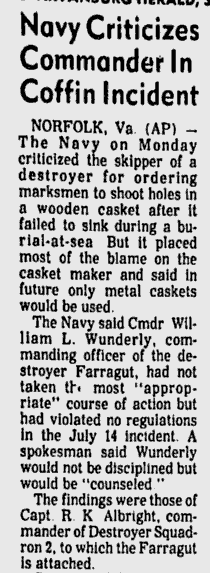


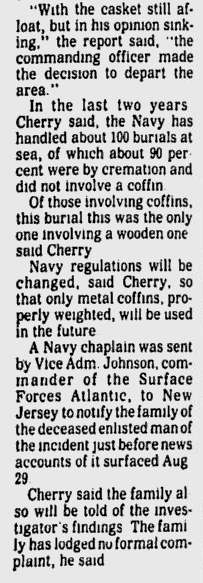
Original article here.
Posted By: Paul - Wed Nov 16, 2016 -
Comments (3)
Category: Death, Kludges, Hacks and Duct-tape Repairs, Military, Oceans and Maritime Pursuits, 1980s
Zorbing
Home page here.
Posted By: Paul - Fri Nov 04, 2016 -
Comments (0)
Category: Daredevils, Stuntpeople and Thrillseekers, Death
Ted V. Mikels, RIP
Obituary here.
Posted By: Paul - Wed Oct 19, 2016 -
Comments (2)
Category: Death, Eccentrics, Horror, Movies, 1960s, Blood, Dismemberment, Screams, Grunts and Other Exclamations
Signal 30
In 1959, the Ohio State Highway Patrol produced a 27-minute film showing graphic scenes of fatal traffic accidents. The footage was accompanied by a soundtrack of the cries and moans of the victims. They called the film "Signal 30" — referring to the patrol's radio code for fatal accidents.The film was shown at many high schools, in an attempt to scare kids into being good drivers. Some judges also made people with traffic violations watch it "to atone for their violations." It got some dramatic reactions from viewers. For instance:
Another woman had to be carried from the courtroom and given oxygen after she watched a truck driver burning to death in the color-and-sound film.
The film is now on YouTube, so you can find out how you would react to it. (I actually haven't had the courage to watch it yet.)
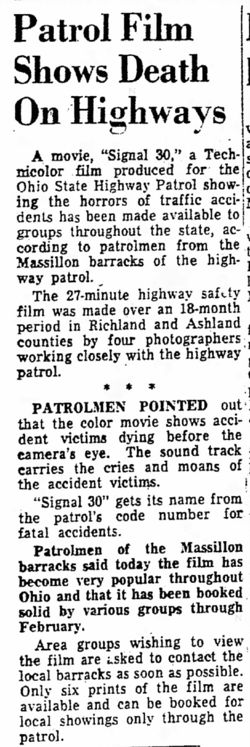
Massillon Evening Independent - Jan 20, 1960

Asbury Park Press - Aug 10, 1962
More info: wikipedia.
Posted By: Alex - Wed Oct 05, 2016 -
Comments (8)
Category: Death, Movies, Documentaries, 1960s, Cars
Drank Embalming Fluid

The Lima News - Feb 2, 1919
This 1919 news report of two railroad employees who drank from a barrel of alcohol, not aware that it was being used to preserve two human skeletons enroute to a medical school, sounds a lot like the "corpse in the cask" urban legend.
The legend, which dates back at least to the nineteenth century, played on the fear of accidental cannibalism. As explained by Jan Harold Brunvand in his Encyclopedia of Urban Legends:
In one version of the tale, following the Battle of Trafalgar in 1805 the body of Lord Nelson was preserved in a barrel of brandy, from which sailors sipped as it made its way back to England, inspiring the expression "tapping the admiral."
Posted By: Alex - Tue Oct 04, 2016 -
Comments (3)
Category: Death, Inebriation and Intoxicants, 1910s
Clark Metal Grave Vault
Rain protection for the dearly departed.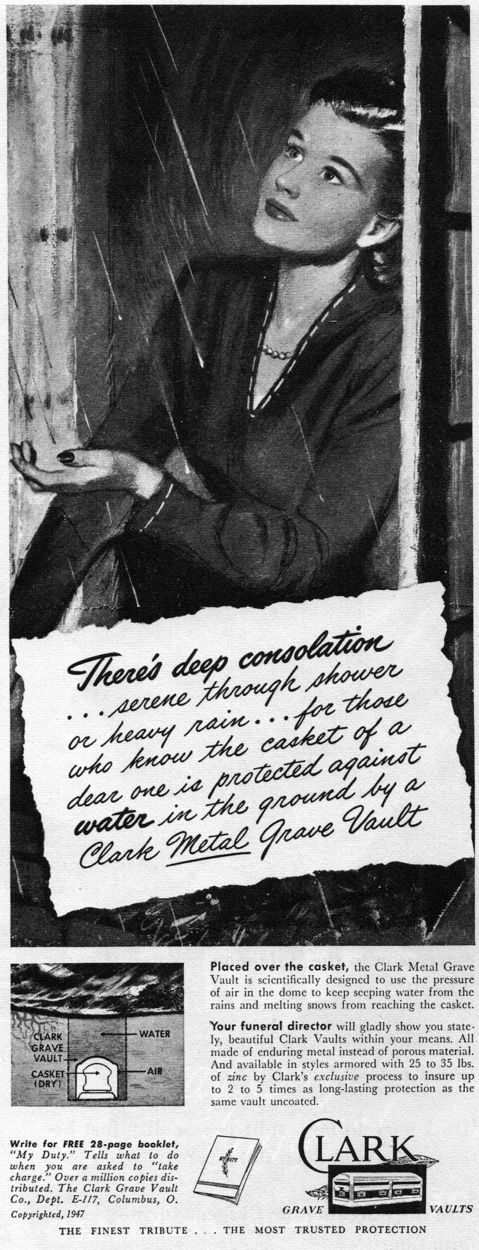
I found this ad reproduced in Marshall McLuhan's The Mechanical Bride (1951). He comments:
Unfortunately, McLuhan never specified where he found the ad. But it's listed in a 1947 catalog of copyright entries. So must be a 1947 ad.
Posted By: Alex - Sun Oct 02, 2016 -
Comments (5)
Category: Death, Advertising, 1940s
Cremain Frisbees
When "Steady" Ed Headrick, inventor of the Frisbee, died in 2002, he left instructions in his will that he wanted his ashes to be incorporated into discs so that he could fly like a frisbee. His wishes were honored, and you can still buy a set of these cremain frisbees at the Disc Golf Association for $200.Discraft, the company that made the "Steady" Ed Memorial Frisbees, explained: "We understand that some people may not want to play with the discs and they might end up on a wall as collectibles. Therefore, we are selling the discs as sets of two so that you can at least play with one and keep the other in a pristine state."
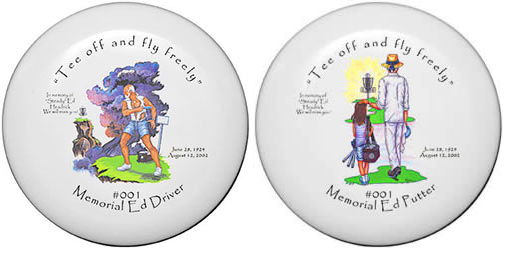
There's also a single Steady Ed Cremain Frisbee with a different design for sale on eBay, currently going for $89.99.
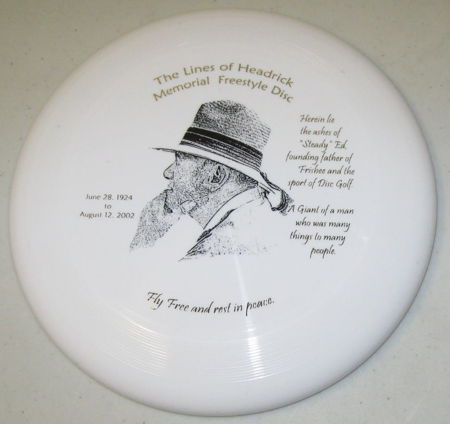
Posted By: Alex - Fri Sep 30, 2016 -
Comments (1)
Category: Death, Sports
Follies of the Madmen #293
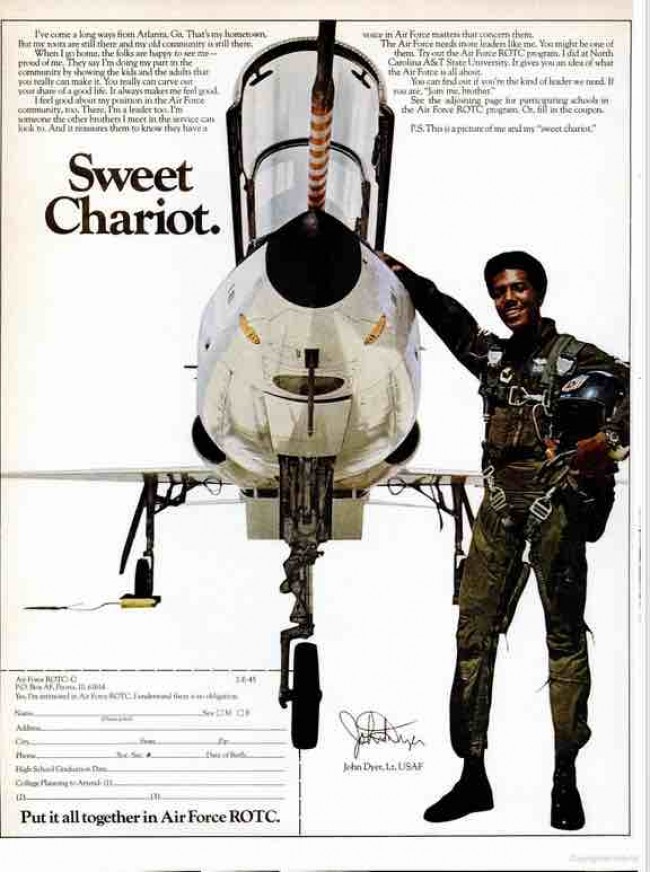
Death-dealing war instrument of mass destruction compared to treasured hymn.
Original ad here.
Posted By: Paul - Mon Sep 26, 2016 -
Comments (6)
Category: Death, War, Armed Forces, Weapons, Advertising, 1970s
Killed by a watermelon
One for the weird death file.1924: Thomas Collins, 21-years-old, drove by a farmer with a truck full of watermelons and called out to the farmer to toss him one. The farmer obliged. The watermelon landed on Collins' head, snapped his neck, and killed him instantly.

Louisville Courier-Journal - Sep 28, 1924
Posted By: Alex - Sun Sep 11, 2016 -
Comments (6)
Category: Death, 1920s
8-year-old Undertaker
It sounds like Duana Grant was a very practical-minded young girl. At the age of 8, instead of being squeamish about death, she was learning how to be a mortician, in preparation for taking over the family business at the appropriate time.And it seems that her childhood ambitions became reality. When she was older she married Wilbur Elder and helped run the Grant Elder Funeral Home in Arkansas City.
In 1973, her son took over the business, and he ran it until it closed in August 1982.
Duana died in 2002, at the age of 79.

Green Bay Press-Gazette - Mar 12, 1931
ARKANSAS CITY, Kan. — Death, abhorrent to most children, but to Duana Grant, 8, it awakens only sympathy and a desire to help. Born over an undertaker's parlor and associated with the business all her life, she is learning to conduct a funeral as well as any grownup. Outside business hours, Duana is just an ordinary child, with her school work, dolls, and roller skates.
Posted By: Alex - Sun Sep 04, 2016 -
Comments (0)
Category: Death, Jobs and Occupations, Children

| Who We Are |
|---|
| Alex Boese Alex is the creator and curator of the Museum of Hoaxes. He's also the author of various weird, non-fiction, science-themed books such as Elephants on Acid and Psychedelic Apes. Paul Di Filippo Paul has been paid to put weird ideas into fictional form for over thirty years, in his career as a noted science fiction writer. He has recently begun blogging on many curious topics with three fellow writers at The Inferior 4+1. Contact Us |




